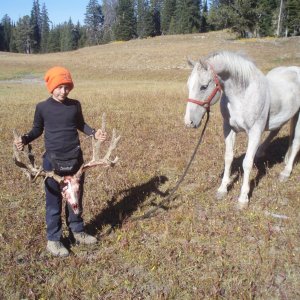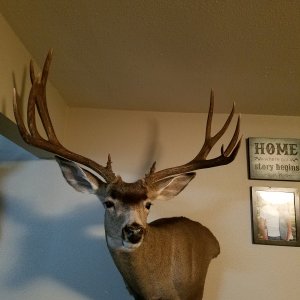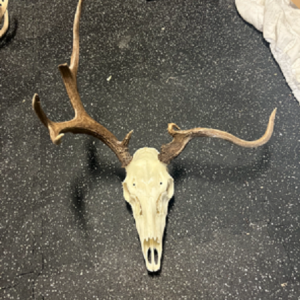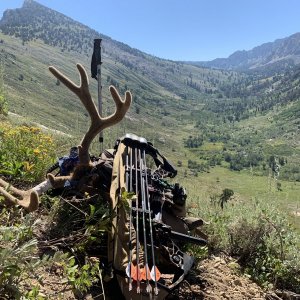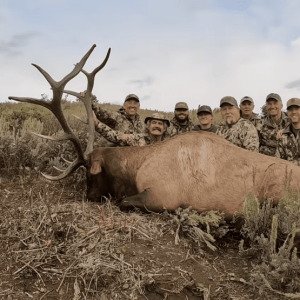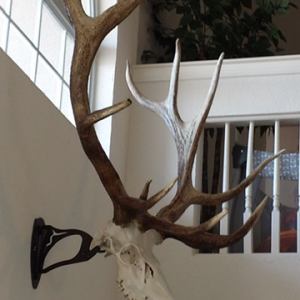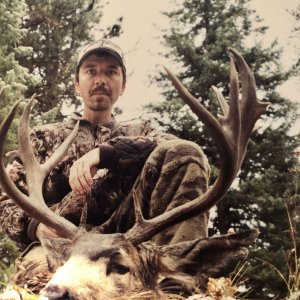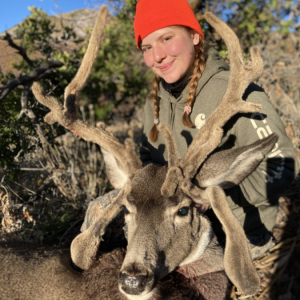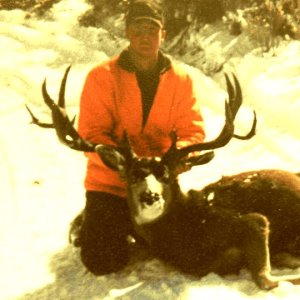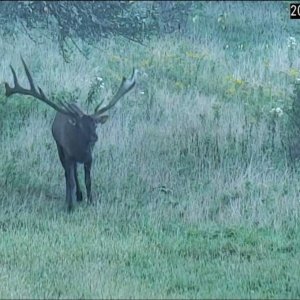2
270hunt
Guest
The road to the Lassen County town of Herlong is wide, dusty and usually deserted. Most days, motorists using it won't see anything interesting, much less a bloodbath.
Feb. 24, 2009, was different. On that cloudy, crisp afternoon, a poacher plying his trade near the road picked off antelope one by one with a small-caliber rifle.
The hunter had tallied several kills when something in the distance apparently spooked him, causing him to flee. Game wardens arrived shortly afterward. They found four antelope dead. They euthanized a fifth that had been badly wounded. Two of the dead antelope were pregnant with three calves between them.
"In a matter of seconds, the poacher took eight antelope out of the population," investigating warden Carol Growdon said at the time.
The issue of illegal hunting received an unusual burst of public attention last month when rock star and celebrity hunter Ted Nugent pleaded no contest to two misdemeanor hunting violations in Yuba Superior Court: illegally baiting a deer, and failing to have a deer tag signed by a government official after a kill.
He had broadcast the violations on his own Outdoor Channel hunting show. The Feb. 9 episode showed Nugent killing a young male deer with bow and arrow near the El Dorado County town of Somerset. The charges were filed in Yuba County because Nugent was accompanied by a guide and cameraman on the hunt, and that is where they live.
As odd as that case was, it hinted at a larger problem.
The eight dead antelope in Lassen County, for instance, were among thousands of animals killed illegally last year as state game wardens logged more hunting violations than any other year in almost two decades.
The 3,400 violations represented a 15 percent increase from 2008 and a 45 percent increase from 2007, according to Department of Fish and Game data analyzed by The Bee.
Game wardens speculate there have been more citations issued simply because violators now represent a larger share of the hunting population. Some break the law to make money selling animal parts. Others may do it out of economic necessity.
"We are pretty sure it has a lot to do with the downturn in the economy, because, unfortunately, there is so much money to be made on the black market," said Lt. Kathy Ponting, who supervises a special investigative unit at Fish and Game.
"I think subsistence hunting and fishing has probably increased because of the economy, where people are not poaching for profit but to put food on the table."
Most poachers undetected
Another theory says scofflaws think their chances of getting caught are slim, since budget cuts have left few wardens on patrol. In reality, after years of decline, the number of wardens has risen recently ? and they're writing more citations.
For much of the last five years, the state had about 200 game wardens in the field, down from 280 a decade ago and among the lowest per-capita warden staffing ratios in America.
About 100 warden positions were eliminated in the 2000 state budget crisis. A hiring freeze followed until 2004. Ongoing fiscal problems have caused warden salaries to slip well below those of other law enforcement agencies. Median pay for a Highway Patrol officer is 50 percent higher than for a game warden.
"We actually have suspects who have said, 'Well, we never get checked by a game warden anyway, so we're not going to buy the hunting license,' " said Jerry Karnow, president of state Fish and Game Wardens Association and a warden in Nevada County.
Karnow said he is working on nine deer poaching cases, and deer hunting season hasn't even started. That's more than he's ever seen at this time of year in his two decades as a warden.
The Schwarzenegger administration budgeted money during the past two years to fund overtime for game wardens. This helped temporarily bolster enforcement and may have contributed to the recent spike in hunting citations, said Patrick Foy, a warden and Fish and Game spokesman.
The state also added several dozen wardens recently, thanks largely to increased training capacity. California now has 250 wardens and roughly 30 vacancies.
"I've been a sportsman for 30 years," said Pat Fitzmorris, president of the California Deer Association. "In the last three or four years, I've seen a lot more wardens."
Unlike Highway Patrol officers, though, game wardens were not exempt from furloughs that began in 2009. And on Sept. 1, Schwarzenegger halted overtime at Fish and Game and other agencies as a stopgap measure amid the latest state budget crisis.
Major environmental groups say the threat to wildlife is significant.
Because of limited resources and a vast coverage area, most poachers get away with it. Wardens estimate they catch about 5 percent of violators.
"In actuality, there's very little enforcement and very (few) wardens out there in the field," said Jim Metropulos, a Sacramento lobbyist with the Sierra Club. "That really hurts conservation efforts."
New law could help
Most hunters pay their fees, follow the rules and thereby help maintain sustainable wildlife populations in California.
Then there are those who don't purchase required tags, take too many animals or kill protected species.
One local case shows how extreme these enterprises can get.
The poaching ring consisted of two south Sacramento residents ? Lofoo Saeteurn and his girlfriend, Merry Saechao ? and a couple of their friends. The group allegedly would drive into rural sections of the region late at night and kill deer, often out of season.
The couple were "turning around and selling (the deer meat) on the black market" for about $150 apiece, said Foy. They mostly sold to friends and neighbors, typical for such an operation.
When game wardens busted the two in 2009, they found about 200 pounds of deer meat and seven animals. Subsequent laboratory analysis, Ponting of Fish and Game said, revealed that Saeteurn had parts from 28 different deer in his freezers. Wardens also recovered illegally harvested abalone, bluegill fish, mushrooms and squirrels.
Saeteurn and Saechao each were charged with 34 separate crimes. Saechao pleaded no contest to one misdemeanor charge, for which she was sentenced to a 60-day work furlough program and three years' probation.
Saeteurn, a repeat offender, is serving a year in jail. That's an unusually harsh penalty. Since all hunting crimes are misdemeanors, violations usually result in small fines.
A law enacted at the start of the year increased the fines and penalties for poaching, meaning lawbreakers could be on the hook for thousands of dollars.
"The previous fines were too low," said Dan Taylor, public policy director for the Audubon Society in California. "They were basically written off as the cost of doing business."
The law diverts some of the revenue raised by the enhanced fines to prosecutors. Many district attorneys historically have hesitated to spend limited resources prosecuting misdemeanor wildlife crimes.
The measure will help, but it won't solve the problem, said Assemblyman Jared Huffman, D-San Rafael, who carried the bill through the Assembly. The poacher on Herlong Road who killed those eight antelope, for instance, was never caught.
"We are just so short-handed," said Huffman, who chairs the Assembly Committee on Water, Parks and Wildlife. "There are a lot of these illegal activities that we will never know about."
Feb. 24, 2009, was different. On that cloudy, crisp afternoon, a poacher plying his trade near the road picked off antelope one by one with a small-caliber rifle.
The hunter had tallied several kills when something in the distance apparently spooked him, causing him to flee. Game wardens arrived shortly afterward. They found four antelope dead. They euthanized a fifth that had been badly wounded. Two of the dead antelope were pregnant with three calves between them.
"In a matter of seconds, the poacher took eight antelope out of the population," investigating warden Carol Growdon said at the time.
The issue of illegal hunting received an unusual burst of public attention last month when rock star and celebrity hunter Ted Nugent pleaded no contest to two misdemeanor hunting violations in Yuba Superior Court: illegally baiting a deer, and failing to have a deer tag signed by a government official after a kill.
He had broadcast the violations on his own Outdoor Channel hunting show. The Feb. 9 episode showed Nugent killing a young male deer with bow and arrow near the El Dorado County town of Somerset. The charges were filed in Yuba County because Nugent was accompanied by a guide and cameraman on the hunt, and that is where they live.
As odd as that case was, it hinted at a larger problem.
The eight dead antelope in Lassen County, for instance, were among thousands of animals killed illegally last year as state game wardens logged more hunting violations than any other year in almost two decades.
The 3,400 violations represented a 15 percent increase from 2008 and a 45 percent increase from 2007, according to Department of Fish and Game data analyzed by The Bee.
Game wardens speculate there have been more citations issued simply because violators now represent a larger share of the hunting population. Some break the law to make money selling animal parts. Others may do it out of economic necessity.
"We are pretty sure it has a lot to do with the downturn in the economy, because, unfortunately, there is so much money to be made on the black market," said Lt. Kathy Ponting, who supervises a special investigative unit at Fish and Game.
"I think subsistence hunting and fishing has probably increased because of the economy, where people are not poaching for profit but to put food on the table."
Most poachers undetected
Another theory says scofflaws think their chances of getting caught are slim, since budget cuts have left few wardens on patrol. In reality, after years of decline, the number of wardens has risen recently ? and they're writing more citations.
For much of the last five years, the state had about 200 game wardens in the field, down from 280 a decade ago and among the lowest per-capita warden staffing ratios in America.
About 100 warden positions were eliminated in the 2000 state budget crisis. A hiring freeze followed until 2004. Ongoing fiscal problems have caused warden salaries to slip well below those of other law enforcement agencies. Median pay for a Highway Patrol officer is 50 percent higher than for a game warden.
"We actually have suspects who have said, 'Well, we never get checked by a game warden anyway, so we're not going to buy the hunting license,' " said Jerry Karnow, president of state Fish and Game Wardens Association and a warden in Nevada County.
Karnow said he is working on nine deer poaching cases, and deer hunting season hasn't even started. That's more than he's ever seen at this time of year in his two decades as a warden.
The Schwarzenegger administration budgeted money during the past two years to fund overtime for game wardens. This helped temporarily bolster enforcement and may have contributed to the recent spike in hunting citations, said Patrick Foy, a warden and Fish and Game spokesman.
The state also added several dozen wardens recently, thanks largely to increased training capacity. California now has 250 wardens and roughly 30 vacancies.
"I've been a sportsman for 30 years," said Pat Fitzmorris, president of the California Deer Association. "In the last three or four years, I've seen a lot more wardens."
Unlike Highway Patrol officers, though, game wardens were not exempt from furloughs that began in 2009. And on Sept. 1, Schwarzenegger halted overtime at Fish and Game and other agencies as a stopgap measure amid the latest state budget crisis.
Major environmental groups say the threat to wildlife is significant.
Because of limited resources and a vast coverage area, most poachers get away with it. Wardens estimate they catch about 5 percent of violators.
"In actuality, there's very little enforcement and very (few) wardens out there in the field," said Jim Metropulos, a Sacramento lobbyist with the Sierra Club. "That really hurts conservation efforts."
New law could help
Most hunters pay their fees, follow the rules and thereby help maintain sustainable wildlife populations in California.
Then there are those who don't purchase required tags, take too many animals or kill protected species.
One local case shows how extreme these enterprises can get.
The poaching ring consisted of two south Sacramento residents ? Lofoo Saeteurn and his girlfriend, Merry Saechao ? and a couple of their friends. The group allegedly would drive into rural sections of the region late at night and kill deer, often out of season.
The couple were "turning around and selling (the deer meat) on the black market" for about $150 apiece, said Foy. They mostly sold to friends and neighbors, typical for such an operation.
When game wardens busted the two in 2009, they found about 200 pounds of deer meat and seven animals. Subsequent laboratory analysis, Ponting of Fish and Game said, revealed that Saeteurn had parts from 28 different deer in his freezers. Wardens also recovered illegally harvested abalone, bluegill fish, mushrooms and squirrels.
Saeteurn and Saechao each were charged with 34 separate crimes. Saechao pleaded no contest to one misdemeanor charge, for which she was sentenced to a 60-day work furlough program and three years' probation.
Saeteurn, a repeat offender, is serving a year in jail. That's an unusually harsh penalty. Since all hunting crimes are misdemeanors, violations usually result in small fines.
A law enacted at the start of the year increased the fines and penalties for poaching, meaning lawbreakers could be on the hook for thousands of dollars.
"The previous fines were too low," said Dan Taylor, public policy director for the Audubon Society in California. "They were basically written off as the cost of doing business."
The law diverts some of the revenue raised by the enhanced fines to prosecutors. Many district attorneys historically have hesitated to spend limited resources prosecuting misdemeanor wildlife crimes.
The measure will help, but it won't solve the problem, said Assemblyman Jared Huffman, D-San Rafael, who carried the bill through the Assembly. The poacher on Herlong Road who killed those eight antelope, for instance, was never caught.
"We are just so short-handed," said Huffman, who chairs the Assembly Committee on Water, Parks and Wildlife. "There are a lot of these illegal activities that we will never know about."

